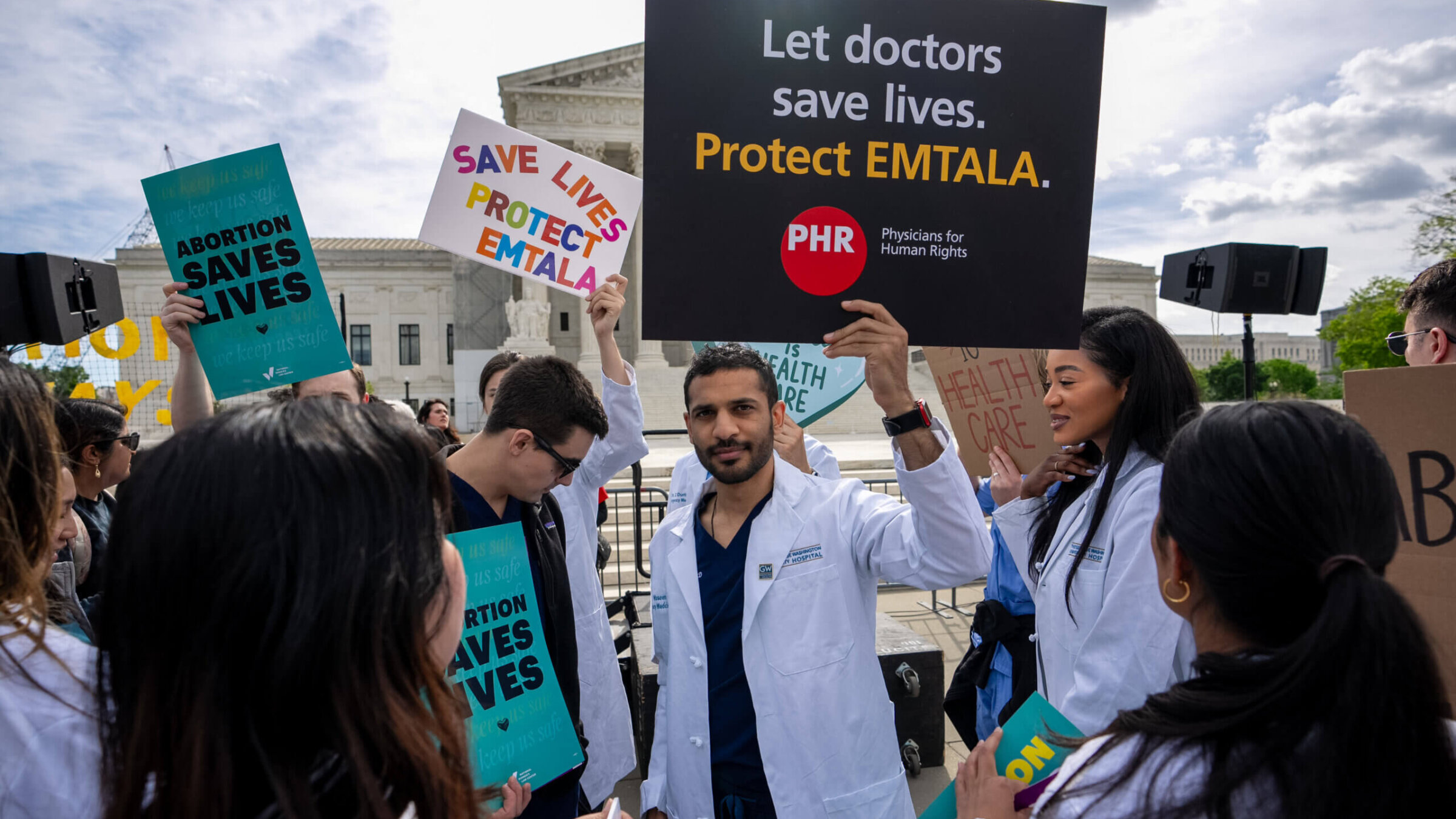Jewish law says we must wait for justice. For abortion rights, the cost of that wait is too high
The Supreme Court today granted temporary relief to those terrified of further cuts to abortion access — but it’s not enough

A group of doctors join abortion rights supporters at a rally outside the Supreme Court. The Court heard oral arguments on a case to decide if Idaho emergency rooms can provide abortions to women in a pregnancy emergency, April 24, 2024 in Washington, DC. Photo by Andrew Harnik/Getty Images
The very first line of Pirkei Avot (“Ethics of our Fathers”), urges “patience in the administration of justice.”
For millions of Americans, however, the administration of justice — specifically, by our Supreme Court on matters related to reproductive choice — requires an inhuman amount of patience. We are asked to wait calmly while they figure out just how much more dangerous it will become to be pregnant in America.
On Thursday, the Supreme Court decided that, for now, hospitals in the state of Idaho can perform emergency abortions, in ruling on a challenge to an Idaho law passed in 2020 — with a provision that it would go into effect only if Roe v. Wade was overturned — that made abortion permissible only to prevent death.
For those who believe passionately in women’s reproductive rights — and who have already waited so long for the administration of justice when it comes to enshrining them — it’s a mixed victory.
On the one hand, the decision is a relief. It means that, for now at least, the Supreme Court did not make it even more dangerous to be pregnant in this country. Pregnant people in Idaho can get emergency abortions in cases where a person’s health is at risk — as opposed to just their life — at least until the law faces its next legal challenge, as the court returned the case to lower courts for further litigation, rather than fully overturning it. (As the ACLU points out, under the Idaho abortion ban as written, doctors will need to ask themselves exactly how much blood a woman can lose and how many organ systems have to fail before they can consider her life at risk; death being the only standard puts people’s lives at greater risk.)
And it means that, at least for now, the court has chosen not to give further credit to the concept of fetal personhood, or the idea that fetuses are entitled to the full rights of a living person. Since the Idaho law used the term “unborn child,” and not “fetus” or “embryo,” some suggested that if the Supreme Court had ruled in favor of the state, that decision could have been seen as setting a precedent in which fetal personhood was an accepted feature of American law, which would also endanger in vitro fertilization.
But on the other hand, the relief is fleeting: The case is not over. There will, in time, likely be a trial before a district court judge in Idaho. And then it will likely go back up the judicial system, working its way, perhaps, back to the Supreme Court. (One could be forgiven for wondering if at least some on the court are not trying to punt the decision until after the 2024 presidential election, having seen voters mobilize behind Democratic politicians in response to Dobbs and its fallout in the 2022 midterm election.)
Justice Thomas Alito, in his dissent to Moyle v. United States and Idaho v. United States, had the audacity to write, “The Members of this Court are not physicians and should therefore be wary about expressing conclusions about medical issues.” In this extremely limited sense, he is correct. And yet, in writing the majority decision that overturned Dobbs last year, he took the decision as to whether a woman could have an abortion away from her and her doctor. His dissent itself, which seems to take issue with the idea that an abortion might be necessary for the health of a pregnant person and that that should matter, is a reminder that the battle for reproductive freedom is very far from won.
Which takes us back to Pirkei Avot. For justice, we must wait.
Despite his stated enthusiasm for religion in society, Alito and the other justices who overturned Roe in 2022 impeded our ability to exercise religious freedom — a miscarriage of justice. As the National Council of Jewish Women has pointed out, Jewish law does not believe that life begins at conception, or that a fetus is alive. That we are having this discussion at all is an assault on religious liberty, which will make its way, along with the Idaho law, back down and up our legal system.
We will have to wait to see what they decide.
And while it is true that, in the meantime, doctors can still perform emergency abortions in Idaho, it is likely that they will only do so with tremendous hesitation. What about the doctors who worry that, if they perform an abortion, it will be deemed by someone or some court to not have been necessary? A study last year from KFF found that abortion bans have had a dire effect on OB-GYNs by making them afraid of legal consequences for providing care. 68% of them believe that the Dobbs ruling has worsened their ability to treat pregnancy-related emergencies. More than 20% of Idaho obstetricians moved out of the state after the abortion ban took effect, according to a report from the Idaho Coalition for State Healthcare.
We have also seen that the end of Roe v. Wade has had a chilling effect on women’s reproductive decision-making: Last year, a third of young women said they or someone they knew decided not to try to get pregnant because of the state of maternal healthcare in this country post-Roe.
We must wait. And waiting has a cost.
The Moyle decision once again took emergency abortion care management from families, individuals and their doctors and left it with voters, lawmakers and judges at the state and federal level, the vast majority of whom are not remotely qualified to make these literal life-and-death decisions. (Keep in mind that about a fifth of the American voters who elect our lawmakers believe that eggs in ovaries have shells, which they do not, and that periods begin on the first of the month; menstrual cycles are not dictated by human calendars.)
The root word for “patience” in Hebrew is related to the words for “suffering” and “burden.” Here, that is fitting. The case of the Moyle ruling reminds us that, in overturning Roe, our esteemed justices rendered a judgment of suffering for millions of Americans, who are now carrying the burden of patience with a legal system that has put their very lives in danger.















